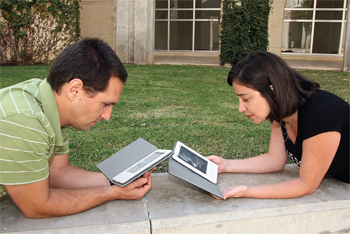| Previous issues | Subscribe |
| STUDENTS & GRADUATES |
|---|
|
|
|
|
|
|
|
|
| TECHNOLOGY |
|---|
|
|
|
|
| INITIATIVES - LANGUAGE |
|---|
| INTERNATIONAL |
|---|
| HIGHLIGHTS |
|---|
|
|
|
|
|
|
|
|
|
|
|
|
|
|
|
Co-editors: Elissa Allerhand, Ilene Bloch-Levy Photographer: Gideon Markowitz Graphic Designer: Laura Grinberg Web Manager: Batsheva Engelberg-Behr Web Master: Sonia Pechersky |
| TECHNOLOGY |
|---|
Digital University: Mobile Digital Books Project
Is the Open University to Become Totally Digital?That is the question behind the University's Mobile Digital project, now in the third stage of a pilot project and including more than 200 students from six of the University's most popular courses."Sadan," an acronym for the Open University's Mobile Digital Books project, is moving into Stage 3 of a multi-semester pilot program. Last year, in Stage One, 115 students participated in using mobile digital devices in two courses: "Genocide" and "Human Rights in International Relations." Because the University's textbooks play such an integral role in its academic programs, it was crucial for the University to know if mobile digital books could serve as an effective alternative learning tool to print textbooks in active learning as well as in ongoing studies. The results of Stage One indicated that students were less than fully satisfied with the mobile devices. They were encountering specific problems such as being able to write comments or highlight, as well as the mobile device's page turning capability. As such, the University's project coordinators concluded that the key problem lie in the mobile device itself rather than the program. What was interesting to note was that venue had a lot to do with use preferences. At home or in the classroom, students preferred to use the print textbooks, however, once outside this venue, the mobile digital book took preference. Overall, half of the students felt positive regarding the use of the mobile digital book devices, while half were ambivalent. While it was obvious to the project coordinators that a very large group of students found it difficult to change their study habits (i.e. to use mobile devices for textbook studies), improving the digital technology and the growing familiarity with mobile devices led to Stage Two, where the mobile device was replaced with an IPad. In this stage of the pilot, iDigital provided the Open University with 20 IPads, which were distributed to students in the "Genocide" course. The University was anxious to compare results from the previous year. However, the IPad wasn't the only difference. The IPads were fully integrated with the University's video and digital learning environments, including live video classes, post-class recordings, vocal books and the ability, through the "Opel" environment, to surf on the individual course websites. Initial results indicate that students made extensive use of the different learning environments and were eminently satisfied. We are awaiting the final results of the survey to determine if the IPad is indeed the optimal mobile tool for this kind of academic environment at the Open University. This past semester, Stage Three of the pilot program was launched, this time expanding the use of the mobile digital device to include six courses: Introduction to Psychology, Financial Theory, Introduction to Accounting, Marketing Management, Introduction to Mass Media and Genocide, and to introduce the Android as an alternative mobile device. As part of the University's continuing survey of the feasibility of mobile devices, more than 200 of the 3,900 students in these six courses agreed to use the mobile devices. They will also receive print text books. The Open University is anxious to see the results of this Third Sage of the pilot program. The Open Digital Book Project won an award for excellence in an international conference held in Boston. |
